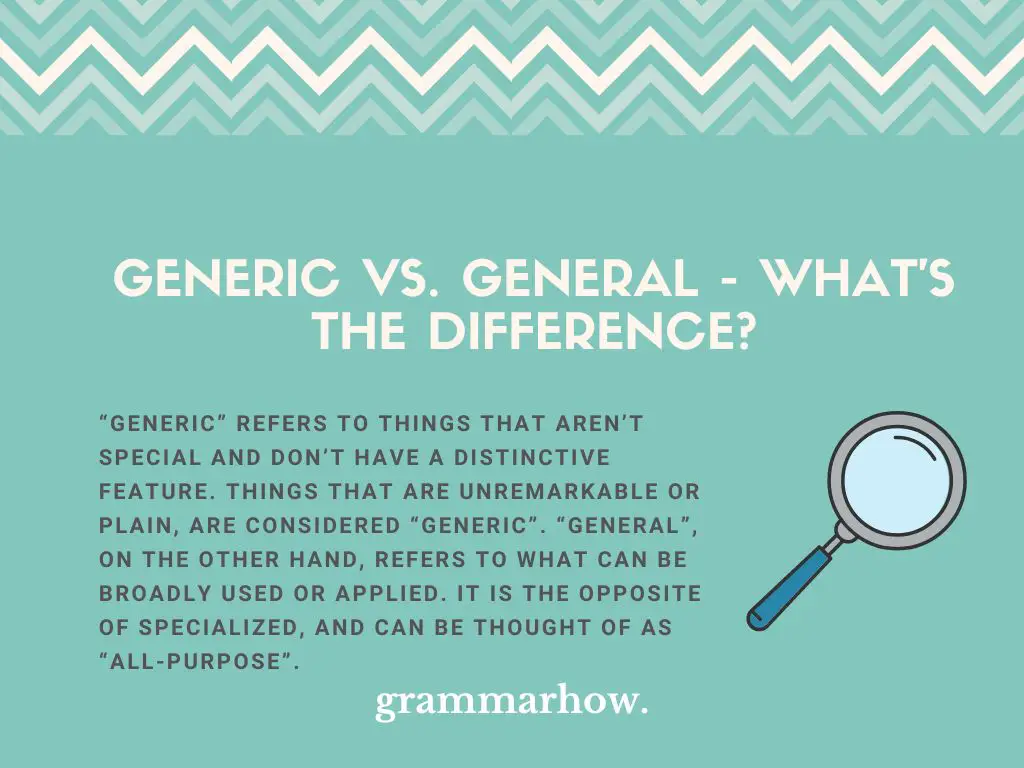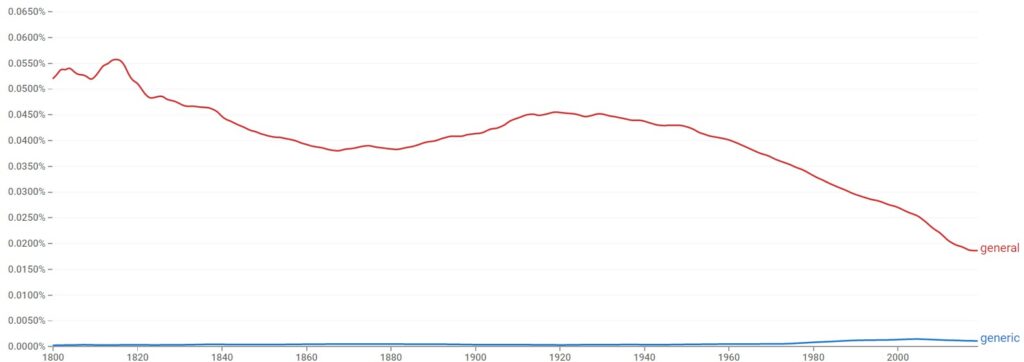Similar words sometimes have different meanings. But their similarity may cause some confusion, leading us to make mistakes on how to apply each of the words in daily life.
“Generic” and “General” are good examples of this. What exactly does each of them mean? And how can we use them?
Generic vs. General – What’s the Difference?
“Generic” refers to things that aren’t special and don’t have a distinctive feature. Things that are unremarkable or plain, are considered “Generic”. “General”, on the other hand, refers to what can be broadly used or applied. It is the opposite of specialized, and can be thought of as “all-purpose”.

Take a look at some examples:
- Ashley bought a generic toothpaste.
- Cola is a generic term used for any brand of soda.
- Toothpaste prevents general tooth concerns, such as cavities.
- My general field of work is architecture.
The toothpaste examples are helpful in understanding the difference between “Generic” and “General”. Think about this: when someone buys a “Generic” toothpaste, it means they didn’t seek any particular brand.
However, toothpaste is used for an array of reasons. It’s used to prevent many common problems that could happen to anyone (such as cavities). Therefore, we say that toothpaste prevents “General” tooth concerns.
In other words, you can buy a “Generic” toothpaste because any toothpaste would help prevent “General” problems.
What Does “Generic” Mean?
Something “Generic” is, simply put, a group of things that has no special characteristics or is unremarkable. Frequently, we use “Generic” for everything that is unbranded. It’s also used to describe a class, a group or a kind.
According to the Cambridge Dictionary, “Generic” is something shared by, typical of, or relating to a whole group of similar things rather than to any particular thing.
Take a look at how to use “Generic” in a sentence:
- The woman used a generic store brand shampoo.
- He looked generic in his khakis and polo shirt.
- Loyalty to humans seems to be a generic trait for dogs.
- Though some people find brown a generic color, I enjoy it.
- The children asked for some generic candy.
As you can see by the examples, “Generic” describes things that are plain and simple, that would not normally stand out from their group. It is used for groups or items that aren’t special.
For example, dogs are loyal, and to find a loyal dog wouldn’t surprise anyone. As nice as loyalty is, when it comes to dogs it’s not a special trait. Therefore, we say loyalty is a “Generic” trait for dogs.
What Does “General” Mean?
“General” refers to things that are very broad in its application. It would be, for example, a principle that has very little exceptions and that most people would accept to be true. Also, “General” is the opposite of specialized.
In the Cambridge Dictionary, the definition we find is that “General” involves or relates to most people, things or places. It also reflects what is the whole of someone or something, not just a particular part of it.
Let’s look at how to use “General” in a sentence:
- The professor taught general English.
- When asked, she could only give a general description of the man.
- His general observation was that the team was confused.
- I believe we need to improve this system in general.
- In general, she was a kind person.
- Peter is a general surgeon.
“General” always carries a broader concept. Take a look at Peter’s example: he’s a surgeon, which is a very difficult job (definitely, not “Generic”, right?) but instead of specializing in a field, he chose to be a “General” surgeon.
On the example about the team, note that no particular problem was noticed with any players, individually. The “General” perception was that the whole team was confused.
Which Phrase Is Used the Most?
Which of the words do you think are used more often? Let’s take a look at the graph from Google Ngram Viewer below, and find out.

For the longest time, the use of “Generic” seems to have remained the same, while the use of “General” has decreased significantly. Still, “General” seems to be used more often. If you were to guess, why do you think “General” is more common?
Final Thoughts
“Generic” and “General” aren’t the same, and we should know the difference. “Generic” describes things that are plain, unremarkable or simply don’t stand out at all. “General” describes things that have a broad application, which reflect common knowledge or represent a large group.

Martin holds a Master’s degree in Finance and International Business. He has six years of experience in professional communication with clients, executives, and colleagues. Furthermore, he has teaching experience from Aarhus University. Martin has been featured as an expert in communication and teaching on Forbes and Shopify. Read more about Martin here.
